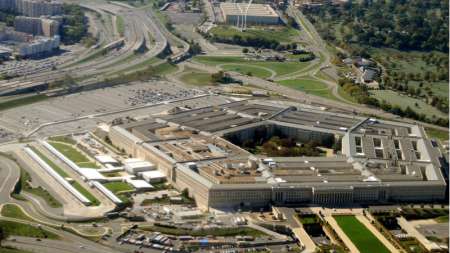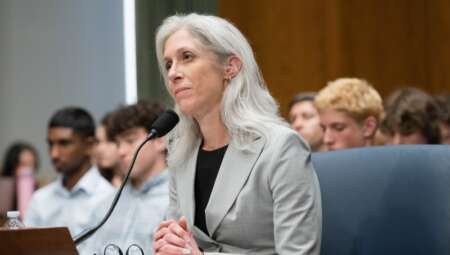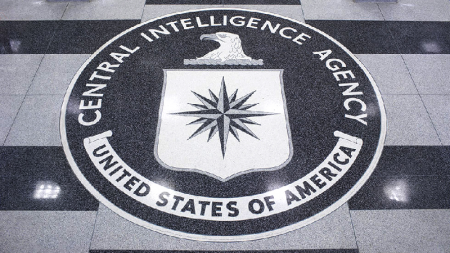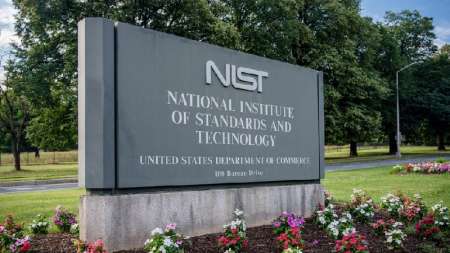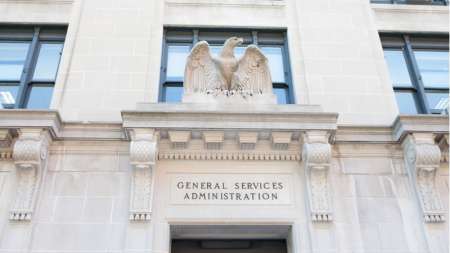Top artificial intelligence practitioners, developers, and visionaries across government and the private sector gathered on Thursday evening at MeriTalk’s Tech Tonic event in Washington, D.C., to honor the 2025 class of AI Honors Award Winners. […]
The National Science Foundation (NSF) announced on Wednesday a new partnership with Voltage Park in support of the agency’s National Artificial Intelligence Research Resource (NAIRR) pilot. […]
Senate and House lawmakers have outlined competing visions for the National Defense Authorization Act (NDAA) for fiscal year (FY) 2026, setting the stage for negotiations over national security policy and military spending priorities and in particular laying out different next steps for the Pentagon on artificial intelligence (AI) approaches. […]
The Defense Department’s (DoD) Chief Digital and Artificial Intelligence Office (CDAO) said today it has awarded contracts for four prominent artificial intelligence (AI) technology developers to help the Pentagon speed adoption of “advanced AI capabilities” including agentic applications. […]
While Federal agencies are busy experimenting with generative artificial intelligence (GenAI) tools, government AI experts on Thursday said that it’s important to make sure employees know how to use the shiny new tools and capabilities – and feel confident doing so. […]
The use of artificial intelligence tools is becoming increasingly common across Federal agencies, but what about deployment of an AI-driven “meta-human?” U.S. Customs and Border Protection (CBP) said the agency has created one and is ready to launch it this year. […]
U.S. Cyber Command’s fiscal year (FY) 2026 budget request includes a new initiative to rapidly test and validate artificial intelligence (AI) technologies for operational cyber missions. […]
The U.S. Senate voted early Tuesday morning to drop from its reconciliation legislation a controversial 10-year moratorium on state regulation of artificial intelligence tech after the proposed ban met significant bipartisan pushback. […]
Susan Monarez, President Donald Trump’s nominee to lead the Centers for Disease Control and Prevention (CDC), on Wednesday pledged her commitment to using AI tech to support CDC operations and public health outcomes. […]
A bipartisan group of lawmakers introduced a bill during a congressional hearing today that would prevent Federal agencies from buying or using artificial intelligence models created by companies with ties to the Chinese Communist Party (CCP) and other foreign adversaries. […]
The Transportation Security Administration (TSA) is looking at how it can integrate artificial intelligence (AI) into its Geographic Information Infrastructure (GII), which is a shared sensitive but unclassified platform that provides critical geospatial capabilities across the Homeland Security Enterprise. […]
Bipartisan legislation introduced in the Senate on June 13 aims to reduce fraud, waste, and abuse in the Medicare system by harnessing artificial intelligence technologies for that task. […]
Lakshmi Raman, chief artificial intelligence officer (CAIO) at the CIA, said on Tuesday that she’s excited about the potential of AI agents to further the cause of enterprise automation at the agency. […]
David Sacks, President Donald Trump’s special advisor for AI and crypto, stressed the need for the United States to win the AI race during remarks on Tuesday and warned that the “repercussions would be significant” if it fails to do so. […]
The Department of Defense’s (DoD) newest artificial intelligence (AI) initiative is helping the Pentagon move swiftly to integrate generative AI into military and enterprise operations and ensure that the military keeps pace with industry advances, according to a senior official from the Chief Digital and Artificial Intelligence Office (CDAO). […]
The Commerce Department is rebranding the U.S. Artificial Intelligence Safety Institute (AISI) that it oversees by swapping in a new moniker for the organization – the Center for AI Standards and Innovation (CAISI) – that notably does not feature safety in its name. […]
Automation is emerging as a key enabler in the Department of Defense’s (DoD) push toward creating zero trust security architectures, allowing for faster threat remediation and reduced operational burdens. […]
The National Institute of Standards and Technology (NIST) is developing a new “Community Profile” based on the NIST Cybersecurity Framework (CSF) that will provide guidance on the cybersecurity risks related to AI development and use. […]
As the uptake in artificial intelligence tech adoption and cryptocurrencies rapidly reshape the financial sector, Commodity Futures Trading Commission (CFTC) Commissioner Christy Goldsmith Romero urged regulators to “keep pace” or risk falling behind and exposing the most vulnerable to harm. […]
While he admits that “not much has gotten done in the first four months of this Congress,” Rep. Don Beyer, D-Va., is hopeful that the 119th Congress will be able to pass some meaningful AI legislation. […]
The U.S. Navy is turning to the private sector for cutting-edge artificial intelligence and machine learning capabilities to strengthen the performance of its maritime operations centers (MOCs), according to a new solicitation issued on May 23. […]
National Geospatial-Intelligence Agency (NGA) Director Vice Adm. Frank Whitworth last week pronounced 2025 as the “year of AI” at NGA, highlighting a new expansion of the agency’s AI-enabled detection for analysts as part of NGA’s artificial intelligence push. […]
The Department of the Air Force is preparing to launch a new Artificial Intelligence (AI) Center of Excellence aimed at accelerating the adoption of AI-enabled capabilities across the service, a spokesperson confirmed. […]
The U.S. Army has launched a new generative AI platform to streamline communication and enhance operational efficiency on a range of fronts – from drafting press releases to reclassifying personnel descriptions, and everything in between. As a demonstration of its capabilities, the Army used the very tool it unveiled to author the press release announcing […]
Robert F. Kennedy Jr., the head of the Department of Health and Human Services (HHS), told lawmakers on Wednesday that HHS is “very aggressively” leveraging AI technologies to drive efficiencies and offset the operational impacts of proposed cuts in the department’s fiscal year (FY) 2026 budget. […]
Artificial intelligence tech is rapidly reshaping the Federal workforce, powering tools that assist doctors in offering early cancer diagnoses and helping procurement officers review complex contracts. […]
The General Services Administration’s (GSA) newly launched generative AI tool is reserved for internal use for now, but GSA Chief AI Officer (CAIO) Zach Whitman said today that the tool has the potential to be applied across government to empower the entire Federal workforce. […]
Nearly a year after unveiling its overarching strategy for artificial intelligence (AI), the U.S. Marine Corps (USMC) has released a detailed implementation plan outlining how it intends to integrate AI capabilities across the service to improve decision-making, operational efficiency, and digital readiness. […]
A bipartisan group of senators has introduced the Testing and Evaluation Systems for Trusted Artificial Intelligence (TEST) AI Act of 2025 to strengthen the Federal government’s ability to test and evaluate AI systems. […]
President Donald Trump plans to rescind a Biden-era rule that would curb the export of advanced AI chips and drew criticism from industry executives who argued the rule would have derailed AI progress and stifled technology innovation in America. […]



